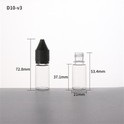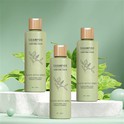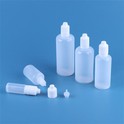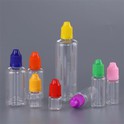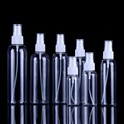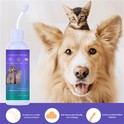The Cove water bottle is a thin, sturdy cylinder, eggshell-white with a matching lid. It feels familiar. “If someone gave that to you,” offered Alex Totterman, Cove’s founder and chief executive, “you probably would have no idea that that wasn’t a plastic bottle.”
If someone does give you this bottle, it would be a remarkable achievement. Scientists and businesses have spent many years and much money trying to replace everyday packaging with natural materials that don’t pollute the Earth — so far, that’s given us little beyond compostable straws. But the challenge hasn’t deterred Cove from its own five-year journey to producing the first “fully biodegradable” bottle of water. In the coming months, Totterman says Cove’s creation will finally hit stores at $2.99 a pop.
Totterman has also said this before. In February 2019, he told Fast Company Cove’s bottles were arriving in stores later that month. They didn’t. In October 2020, Totterman told the Los Angeles Times his bottles were arriving after the new year. Still nope. Pandemic delays and supply chain bottlenecks have repeatedly derailed the startup’s plans, as has the chemistry involved in its mission.
Cove’s investors are still on board. The company has raised $20 million since 2018 from luminaries like Salesforce co-founder Marc Benioff; media heir James Murdoch; and Valor Equity Partners, an early backer of Tesla Inc. Totterman also bagged investment from singer Ellie Goulding, DJ Diplo, and Palm Tree Crew, a holding company co-founded by DJ Kygo — plus a few pop stars he wouldn’t name. By his telling, grocers, music festivals and corporate campuses are waiting with bated breath, and checkbooks in hand, for someone to produce a water bottle that people won’t feel guilty about tossing out, and Cove is nearly ready to produce 20 million bottles a year to meet interest from “pretty much every major retailer and brand,” Totterman said. (Whole Foods is the only named customer.)
Cove’s bottles start in kitchens. RWDC Industries, a chemical supplier with US headquarters in Georgia, first collects cooking oil from restaurants and ferments it into polyhydroxyalkanoates, or PHA, a polymer meant to dissolve in water or soil without any toxic residue. RWDC ships this creation to Cove’s warehouse north of Los Angeles, where it arrives as tiny round pellets that look and feel like bits of Styrofoam. RWDC — the only PHA supplier of Cove’s that the startup would name — adds secret ingredients to its concoction, but Blake Lindsey, the company’s chief commercial officer, said that there’s nothing synthetic involved.
From there, the PHA pellets move to Cove’s 25,000-square-foot factory, where they are sent through machinery to vacuum away moisture, sift out metal, and stretch, cut and mold the material into a hollow canister fit for water. A label is then printed directly onto each bottle (“Cove’s plastic-free, renewable bottles”). The ink, made from algae, is meant to biodegrade, too. Water from a purification plant nearby is poured in. By Cove’s estimates, its bottles will disintegrate in water and soil in under five years.
After starting in 2018, Cove cycled through at least one approach to making its bottles that didn’t pan out. When the company decided to open its own factory, in early 2021, Cove quickly discovered the unpredictability of its Goldilocks material. If PHA gets too cold, it becomes too brittle; if it’s too hot, it goes soft. During one test run, the ingredient overheated, and Cove’s factory floor erupted in steam and a pungent aroma of caramel that one early employee described as “especially vivid.” (The unique properties of PHA mean that different batches produce different scents; during a visit in early October, Cove’s factory floor smelled strongly of buttery popcorn.)

